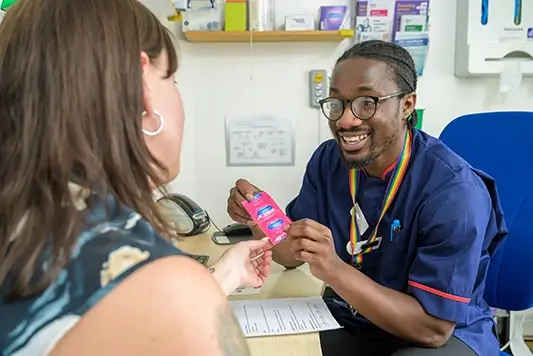For World Contraception Day, we explore the ways that contraception access in England can be improved – and why the current challenges are an equalities issue as well as one of health.
New government, new opportunities
The election of a new government back in July has created an opportunity for a national refresh on sexual and reproductive health policy. Back in 2022, the previous government launched a Women’s Health Strategy, which was in the process of being implemented when the election was called. Despite some positive elements, the strategy had very little focus on reproductive health, with barely a few lines given to abortion, even though abortion is the most common gynaecological procedure performed through the NHS according to the Royal College of Obstetricians and Gynaecologists (RCOG). One in three women needs or chooses an abortion at some point in her life.
There are outstanding issues with contraception access and these gaps need urgently addressing. Baroness Gillian Merron now holds responsibility for abortion care at the Department for Health and Social Care, and she will certainly have her work cut out for her. There are no quick fixes or silver bullets but there are evidence-based recommendations, some of which could be implemented fairly fast, and without major investment or new legislation.
As a starting point, we would welcome a dedicated Sexual and Reproductive Health Strategy, or a refreshed Women’s Health Strategy which recognises the importance of sexual and reproductive health, including abortion. Such a strategy could cover a range of areas, from greater community provision of contraception to reproductive healthcare as an equalities issue.
Contraception should be part of the ‘prevention first’ agenda
Contraception has faced over a decade of cuts dating back to 2015, leaving hundreds struggling to manage their reproductive planning. As with all reproductive healthcare barriers, lack of contraception access disproportionately impacts women and others on the lowest incomes.
The new Chancellor is keen to emphasise her commitment to economic prudence, while the new Health and Social Care Secretary has been keen to highlight the role that prevention can play in health policy. Improving access to contraception is a clear example of how both these visions can work in practice. After all, every £1 invested in contraception saves the Treasury £9. Every £1 invested in publicly funded contraception in certain specific settings can save as much as £48.
A refreshed approach to sexual and reproductive health in this vein could involve a range of policies. For example, NHS commissioners could fund providers like us to offer contraception outside of pregnancy management, and over-the-counter access to the morning after pill and other contraception could be made much easier. Plenty of people are happy to get their contraception from a trained pharmacist. There is already a national plan in delivery to support more provision through pharmacies but to get this right, primary care and community pharmacies will both require resources and training.
Contraception is an equalities issue
There have historically been barriers and hurdles built into reproductive healthcare provision which were never based on clinical evidence. Stigma and paternalism around women’s bodies can be a huge factor. We see this most notably with abortion care but sometimes with contraception as well, such as women reporting that they feel pressured into choosing Long-Acting Reversible Contraception (LARC) when it may not be their preference or the right option for their needs. These barriers can be exacerbated by the intersection of gender and sex with other characteristics, like disability. The Advisory Group on Contraception (of which we are a member) has reported that “almost a quarter of women with physical disabilities, and a fifth of women from marginalised groups overall, report finding access to contraception difficult or very difficult.”
Contraception is healthcare
Contraception isn’t only about reproductive planning. Some forms of contraception can reduce menstrual bleeding and pain. 1 in 10 women (and people who are assigned female at birth) have endometriosis and 1 in 10 have Polycystic Ovary Syndrome (PCOS). These conditions can lead to very severe, even debilitating symptoms and contraceptive products can be an excellent option for managing them. Reproductive healthcare providers like MSI Reproductive Choices UK are trained and resourced to provide LARC but NHS commissioners only fund provision for people who are accessing contraception in relation to being “sexually active”, as part of post-abortion care. Allowing people with endometriosis or PCOS to access contraceptive services from a non-profit provider in their community would speed up access for those who find community care a better option, while easing pressures on the NHS for everyone else. Of course, contraception should never be a replacement for full support and treatment, but if it can ease severe pain for some people in the meantime, it should be considered as an option.
Although endometriosis and PCOS are both common, diagnosis for endometriosis takes 8-12 years on average, and for PCOS it can also be a lengthy process. Access through formal diagnostic pathways is in itself a major inequalities issue. According to Nuffield Department of Women’s and Reproductive Health, Black women are 50% less likely to get an endometriosis diagnosis than white women, despite experiencing the condition at exactly the same rate. Needless to say, direct access to LARC through independent providers does not solve this fundamental problem, and it should never replace GP access. We recommend that GPs be given greater training and support to offer a real range of reproductive planning choices. But NHS-funded access to LARC on an elective basis through providers like us would provide some relief from distressing symptoms for a significant number of people – and it could have a particular benefit for marginalised women.
What happens next?
Of course, these are only a few examples of the improvements that need to be made in contraception policy. Other challenges include recruiting enough doctors and nurses, funding more training posts, and making sure all young people are offered high-quality Relationships, Health, and Sex Education at school.
What we’ve heard from Baroness Merron when answering parliamentary questions about sexual and reproductive healthcare has been encouraging so far. We are hopeful that the government’s ‘prevention-first’ agenda and determination to invest money wisely will translate into a comprehensive national plan for sexual and reproductive health. We look forward to working constructively with them as they do it.
How else can I support reproductive rights on World Contraception Day?
- Share this blog on social media
- Read our blog on why contraception is a feminist issue
- Find out about our global fight for reproductive rights here
*The UK government is responsible for healthcare in England and Wales. Health is devolved in Scotland and Northern Ireland. MSI Reproductive Choices UK currently only provides services in England.











































